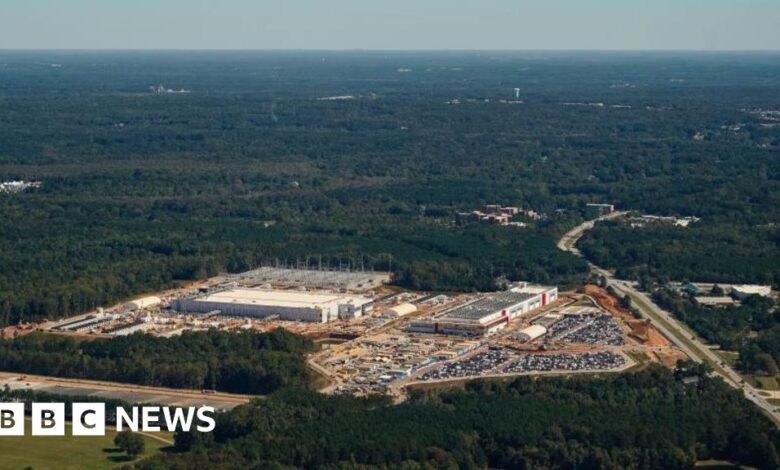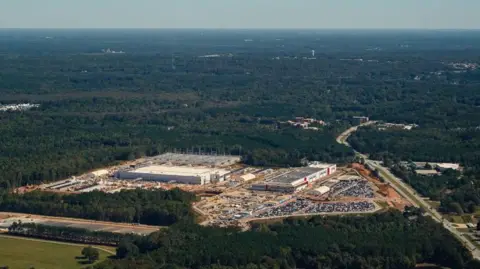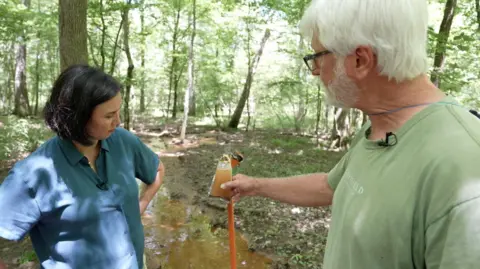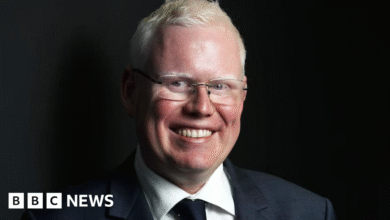‘I can’t drink the water’

North America’s enterprise correspondent
Enterprise correspondent
When Beverly Morris retired in 2016, she believed that she had discovered her dream dwelling – a peaceable extension of the agricultural Georgia, surrounded by bushes and calm.
Right now, nothing however.
Solely 400 yards (366 meters) of its entrance balcony within the Fayette Province, a big constructing is positioned with out home windows stuffed with servers, cables and flashing lights.
It’s a information heart – one of many many individuals who’ve appeared all around the world, and world wide, to run every thing from on-line banking companies to synthetic intelligence instruments comparable to ChatGPT.
“I can not stay in my home with half of my home working and no water,” says Ms. Morris. “I can not drink water.”
She believes that the development of the middle, owned by Meta (the dad or mum firm of Fb), has disrupted its personal nicely, inflicting the buildup of extreme sediments. Mrs. Morris is now transporting water in Dadda to expel her rest room.
She says she needed to restore plumbing in her kitchen to revive water strain. However the water that comes from the faucet nonetheless has residue in it.
“I’m afraid to drink water, however I nonetheless cook dinner with it, and my enamel are brushing with it,” Morris says. “Am I frightened about it? Sure.”
Mita, nonetheless, says the 2 aren’t linked.
In a press release to the British Broadcasting Company, Mita stated, “To be neighbor is a precedence.”
The corporate price an unbiased groundwater research to analyze Morris’s issues. In response to the report, its information heart has not negatively affected the groundwater situations within the area.
Whereas Mita induced the water issues of Mrs. Morris, there is no such thing as a doubt, in her estimation, that the corporate might welcome her as a person.
“This was the proper place,” she says. “However it’s now not.”

We have a tendency to consider the cloud as an invisible factor – floating above us in digital ether. However the actuality may be very bodily.
The cloud lives in additional than 10,000 information facilities world wide, most of that are positioned in the USA, adopted by the UK and Germany.
With synthetic intelligence now within the on-line exercise, this quantity grows rapidly. And with them, extra complaints from the close by inhabitants.
The US increase faces a problem by rising native exercise – with 64 billion {dollars} (47 billion kilos) in initiatives Delayed or prohibited at the country level, In response to a report from the strain group information management heart.
Fears aren’t solely associated to building. It’s also about the usage of water. Sustaining these chilly servers requires loads of water.
“These are extremely popular therapies,” Mark Mills from the Nationwide Vitality Evaluation Middle earlier than the return of Congress in April. “The floor of every slice is hotter than the floor of the solar. It takes loads of water to chill.”
Many facilities use evapoic cooling techniques, as water absorbs warmth and evaporates – much like how sweat is faraway from the warmth from our our bodies. On sizzling days, one elbow can use hundreds of thousands of gallons.
One research estimates that the info facilities pushed by synthetic intelligence can devour it 1.7 trillion gallons Water worldwide by 2027.
Some locations clearly present this stress greater than Georgia – one of many quickest rising information heart markets in the USA.
Its moist local weather supplies a pure and efficient supply of water for cooling information facilities, making it enticing to builders. However that abundance might come at a price.
Gordon Rogers is the CEO of Flint Riverber, a non -profit help group that displays the well being of the Flint River in Georgia. It takes us to the underside of the creek from a brand new building web site for a knowledge heart constructed by American high quality expertise companies (QTS).
George Wames, an area volunteer, raises a pattern of water in a clear plastic bag. It’s cloudy and builder.
“This coloration shouldn’t be,” he says. For him, this means the floor stream of sediments – and probably snowboarding. These are the chemical substances utilized in building to attach the soil and forestall corrosion, but when it escapes to the water system, they’ll create sludge.
QTS says its information facilities meet excessive environmental requirements and provide hundreds of thousands of native tax revenues.
Whereas building is commonly carried out by third -party contractors, it’s the native inhabitants who left to take care of the implications.
“They should not do it,” says Rogers. “The proprietor of the most important rich property doesn’t have greater than a smaller and richer property proprietor.”
Expertise giants say they’re conscious of points and take measures.
“Our aim is that by 2030, we are going to return extra water to the water gatherings and societies by which we run information facilities, which we take out,” says Will Hues, the Amazon Internet Companies Supervision Command.
AWS is investing in initiatives comparable to leakage reforms, rainwater harvesting, and the usage of wastewater for cooling. In Virginia, the corporate works with farmers to scale back nutrient air pollution in Cispick Bay, the most important in the USA.
In South Africa and India – AWS doesn’t use water for cooling – the corporate nonetheless invests in water and high quality entry initiatives.
Within the Americas, Mr. Hughes says, water is used solely in about 10 % of the most popular days yearly.
Nevertheless, the numbers add up. One of many synthetic intelligence question – for instance, ChatGPT – it could actually use it across the largest attainable variety of water like a small bottle you purchase from the nook retailer. Hit it with billions of inquiries a day, and the dimensions turns into clear.

Professor Rajev Graji is aware of the cloud computing at Emory College in Atlanta. He says these databases don’t disappear – if there may be something, they’ve develop into the spine of contemporary life.
“There isn’t any return again.”
However there’s a approach ahead. The hot button is lengthy -term pondering: probably the most clever cooling techniques, rainwater harvesting, and probably the most environment friendly infrastructure.
Within the quick time period, information facilities will create a “big pressure”, because it admits. However the trade has begun to show in the direction of sustainability.
Nevertheless, this can be a small comfort for dwelling house owners comparable to Beverly Morris – caught between yesterday’s dream and the infrastructure of tomorrow.
Information facilities are greater than only a trade development – they’re now a part of nationwide coverage. President Donald Trump has just lately pledged to construct the most important infrastructure undertaking for Amnesty Worldwide in historical past, describing it as “an American information -backed future.”
As soon as once more in Georgia, the solar excels by means of thick moisture – reminding why the nation may be very enticing to the builders of the info heart.
For the native inhabitants, the way forward for expertise is already right here. It’s excessive, thirsty, and typically it’s troublesome to stay subsequent to it.
With the expansion of synthetic intelligence, the problem is obvious: the best way to run the world of digital tomorrow with out depleting the essential provider for all -.
2025-07-09 23:01:00






